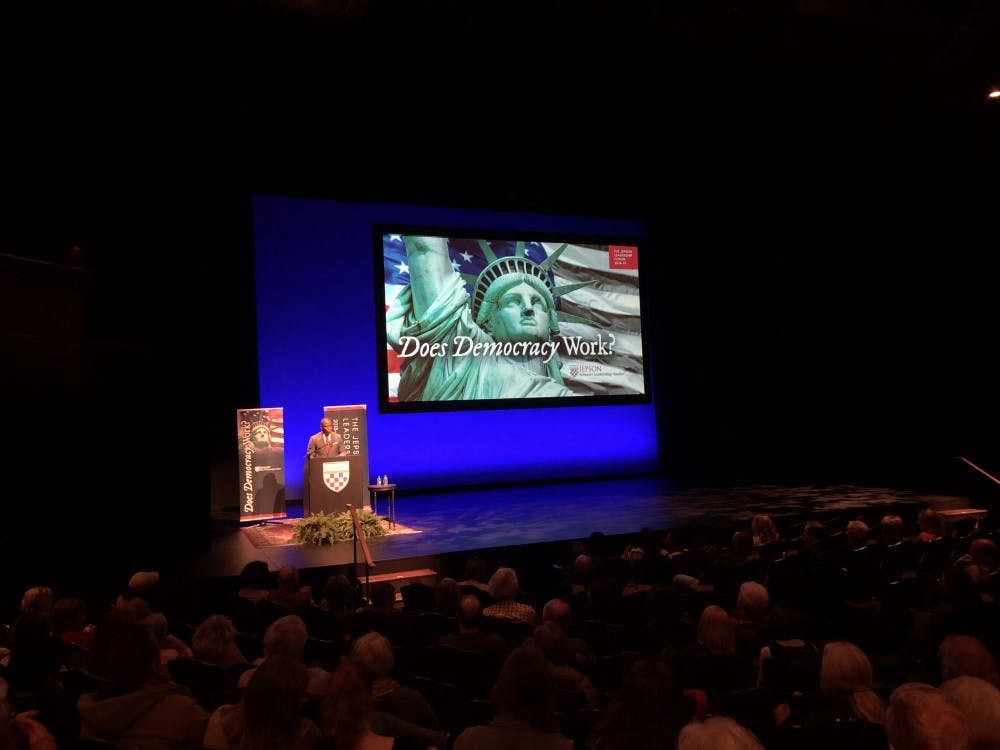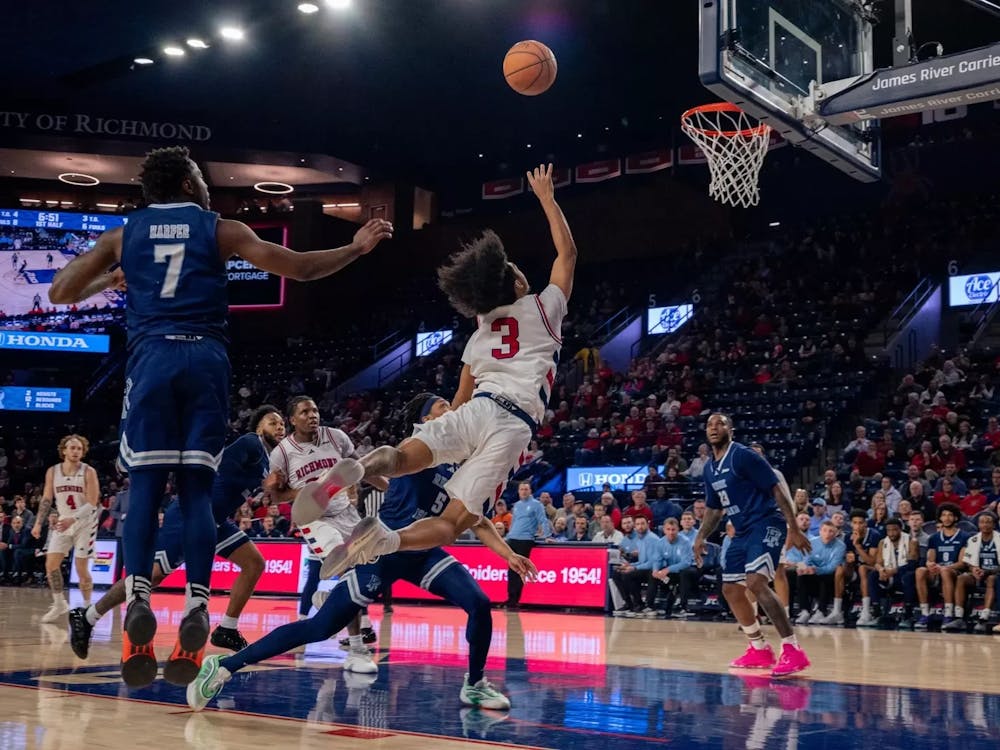Mayor of Richmond Levar Stoney spoke about voter disenfranchisement to a sold out audience in the Alice Jepson Theater on Wednesday, Nov. 28.
Stoney was invited to the University of Richmond as a speaker for the Jepson Leadership Forum, a series of programs offered by the Jepson School of Leadership Studies throughout the year that is centered around a specific theme. This year’s theme is “Does Democracy Work?” according to the forum’s website.
Leadership studies professor Thad Williamson is one of the co-organizer’s of this year’s forum and helped decide this year’s theme. Williamson also worked previously with Stoney for one-and-a-half years and served as the director of his transition team when he was inaugurated as mayor.
“Democracy is in crisis in the United States and the world,” Williamson said. “We need to not only examine the current moment, but we also need to consider how we got here and consider the question of how our democratic systems work and could be improved over time. If we cannot revitalize our democracy, we cannot solve our problems.”
Stoney was supposed to be the first guest speaker for the series, but the original date for his talk in September was canceled because of Hurricane Florence. Instead, Stoney’s event was rescheduled for November, after the midterm elections.
“We did experience a blue wave,” Stoney said about midterms in an interview with The Collegian. “We’ve needed some accountabilities and checks in the system and we will get that in these [House] representatives that are more diverse than ever before: women, Muslims, LGBTQIA+ individuals. That is a major step in the right direction.”
At the speaker event, Stoney focused mainly on voter disenfranchisement in the forms of felon disenfranchisement and gerrymandering. Above all, his focus was on race. Overwhelmingly, statistics showed that people of color such as blacks and Hispanics were more likely to have their voting rights stripped away than white Americans, Stoney said.
“We no longer have poll taxes and literacy tests, but the effects of Jim Crow and black codes are still alive in our commonwealth and beyond,” Stoney said.
Stoney spoke about the reasons he was so passionate about fixing voting disenfranchisement in Virginia and America as a whole. While growing up in Hampton Roads with his grandmother and father, he was passionate about two things: football and politics, he said. He always tried to encourage others to vote, he said, but was dismayed to learn that his father could not because of his felony conviction from his young-adult years in New York.
As former Virginia Gov. Terry McAuliffe’s secretary of the commonwealth, Stoney helped reverse some of Virginia’s strict clemency regulations. By assisting the governor, Stoney was able to help grant clemency to over 172,000 Virginians.
“I’ll never forget that day,” Stoney said. “The joy on people’s faces when that thing that had been taken away, missing for so long, and the smiles that came across their faces – this speaks to the fundamental value and worth of a person and how they feel about the society they live in. The ability to participate.”
Stoney related the story of a former felon who wanted to restore her rights but was worried she wouldn’t be able to until she paid off more than $40,000 in court and restitution fees. After McAuliffe changed the policy to allow former felons to restore their rights while still owing court fees, Stoney was able to call and tell her the news, he said. That day, he said she had sat in front of her church and registered voters for 10 hours.
Enjoy what you're reading?
Signup for our newsletter
“Democracy is not a spectator sport,” Stoney said. “You have to get in the game.”
Along with felon disenfranchisement, Stoney also raised concerns about gerrymandering. Stoney said he believed that gerrymandering kept minority groups away from voting and reinforced the belief among Americans that elections weren’t fair anyway and it was not worth voting.
“In many districts, incumbents choose voters, not the other way around,” Stoney said. “This is not the way to run a democracy.”
Stoney openly supported the idea of an independent entity drawing electoral districts, saying that fairly drawn districts would produce more fair elections.
Senior Gabrielle Bennetti attended the event for her Leadership in a Diverse Society class taught by leadership studies professor Crystal Hoyt. Stoney’s position on gerrymandering resonated with her, she said.
“I’ve seen the pictures of gerrymandered districts,” Bennetti said. “It's ridiculous in how they are drawn. We can’t have a democracy if not everyone can participate.”
Participation was Stoney’s take-home message. America’s future lies in addition of voters, not subtraction, Stoney said. That means making it easier to grant felons clemency, encouraging opt-out instead of opt-in voter registration, removing Virginia’s voter-ID law and redrawing districts fairly using an independent third party.
“As the greatest democracy in the world, we should not be building barriers for people to not participate,” Stoney said in his interview with The Collegian. “We should be knocking barriers down so more have access to the ballot box.”
Contact news editor Julia Raimondi at julia.raimondi@richmond.edu.
Support independent student media
You can make a tax-deductible donation by clicking the button below, which takes you to our secure PayPal account. The page is set up to receive contributions in whatever amount you designate. We look forward to using the money we raise to further our mission of providing honest and accurate information to students, faculty, staff, alumni and others in the general public.
Donate Now



